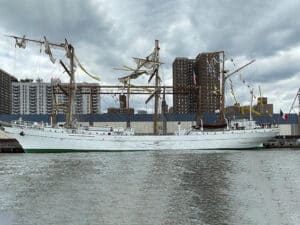
Maersk orders 6 more methanol fueled containerships
Written by Nick Blenkey
Maersk has now ordered 19 vessels with dual-fuel engines able to operate on green methanol
A.P. Moller – Maersk (Maersk) reports that it has ordered a further six large ocean-going vessels capable of operation on green methanol. With a nominal capacity of 17,000 TEU each, they will be built by Korean shipbuilder to replace existing capacity in the Maersk fleet.
“Our customers are looking to us to decarbonize their supply chains, and these six vessels able to operate on green methanol will further accelerate the efforts to offer our customers climate neutral transport,” says Henriette Hallberg Thygesen, CEO of fleet and strategic brands at Maersk. “Global action is needed in this decade in order to meet the Paris Agreement’s goal of limiting global warming to a 1.5°C temperature rise.”
Maersk has set a net-zero emissions target for 2040 across its entire business. It has also set meaningful near-term targets for 2030 to ensure significant progress. These includes a 50% reduction in emissions per transported container in the Maersk Ocean fleet compared to 2020 and a principle of only ordering newbuild vessels that can be operated on green fuels.
With this latest order, Maersk has now ordered 19 vessels with dual-fuel engines able to operate on green methanol.

“Green methanol is the best scalable green fuel solution for this decade, and we are excited to see several other shipowners choosing this path, says Palle Laursen, chief fleet and technical officer at Maersk. “It adds further momentum to the rapid scaling of availability needed to bring down the premium on green methanol and accelerate the evolution of climate neutral shipping.”
Benchmarked against conventional fuel capabilities, additional capital expenditure (CAPEX) for the methanol dual-fuel capability in the newbuilds will be in the 8-12% range, which Maersk says is an improvement compared to the eight vessels it ordered with the same technology last year.
The six 17,000 TEU vessels are all to be delivered in 2025 and will sail under the flag of Denmark. They are being ordered as part of Maersk’s ongoing fleet renewal program and their capacity will replace an equal amount of capacity reaching end-of-life and leaving the Maersk managed fleet.
When all 19 vessels on order are deployed and have replaced older vessels, they will generate annual CO2 emissions savings of around 2.3 million tonnes.
Maersk reiterates that its strategy is to maintain fleet capacity at a maximum of 4.3 million TEU in a combination of Maersk managed and time-chartered vessels.





